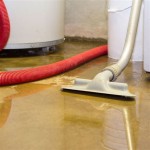A Comprehensive Guide to Concrete Sealer for Basement Floors
Concrete sealers play a crucial role in protecting basement floors from moisture, stains, and wear. Understanding the essential aspects of these sealers is vital for making informed decisions about your basement floor protection. Here's a comprehensive guide to concrete sealers for basement floors, covering everything you need to know.
Types of Concrete Sealers
Concrete sealers come in several types, each with its unique properties and benefits:
- Penetrating Sealers: Absorb into the concrete, filling pores and creating a water-resistant barrier.
- Film-Forming Sealers: Create a film on the concrete surface, providing a high-gloss finish and excellent stain resistance.
- Vapor-Retarding Sealers: Block moisture from seeping through the concrete, preventing mold and mildew growth.
Choosing the Right Sealer
The best concrete sealer for your basement floor depends on your specific needs and preferences. Here are some factors to consider when choosing a sealer:
- Moisture Level: If your basement is prone to moisture, a penetrating or vapor-retarding sealer is ideal.
- Desired Finish: If you want a high-gloss finish, a film-forming sealer is a good choice.
- Durability: Consider the traffic and wear your basement floor will experience when choosing a durable sealer.
- Environmental Considerations: Look for sealers that are low in VOCs (volatile organic compounds) to minimize indoor air pollution.
Applying Concrete Sealer
Proper sealer application is essential for optimal performance. Here are the steps to follow:
- Clean and Prepare the Floor: Remove all dirt, debris, and any existing sealants from the concrete.
- Moisture Test: Check the concrete for moisture using a moisture meter. If the moisture level is too high, wait until it dries.
- Apply the Sealer: Use a brush, roller, or sprayer to apply the sealer evenly on the concrete surface.
- Cure Time: Allow the sealer to dry and cure for the recommended time specified by the manufacturer.
- Moisture Protection: Prevents water and moisture from penetrating the concrete, reducing the risk of mold and mildew.
- Stain Resistance: Seals the concrete surface, making it resistant to stains from spills and dirt.
- Enhanced Durability: Protects the concrete from wear and tear, extending the lifespan of the floor.
- Improved Appearance: Gives the basement floor a clean, polished look.
- Easier Maintenance: Sealed concrete floors are easier to clean and maintain, requiring less frequent cleaning.
Benefits of Concrete Sealers
Concrete sealers offer numerous benefits for basement floors:
Conclusion
Choosing and applying the right concrete sealer for your basement floor can significantly enhance its durability, appearance, and moisture resistance. By considering the factors discussed in this guide, you can make an informed decision that will protect your basement floor for years to come.

Seal Your Concrete Basement Driveway Bricks Radonseal

Colored Concrete Sealer How To Guide

Radonseal Standard Concrete Sealer

Basement Concrete Floor Coatings Better Than Flooring

Clear Concrete Sealer How To Choose The Best Type For Your Project

How To Stain Concrete Basement Floor Diy Guide

Polished Concrete Flooring Options For Your Basement Duraamen

Basement Floor Coating Waterproof Flooring Paint Durall Concrete Coatings

Concrete Floor Coating Waterproofing Sealing Systems

How To Paint A Concrete Floor In Basement Twofeetfirst
See Also








